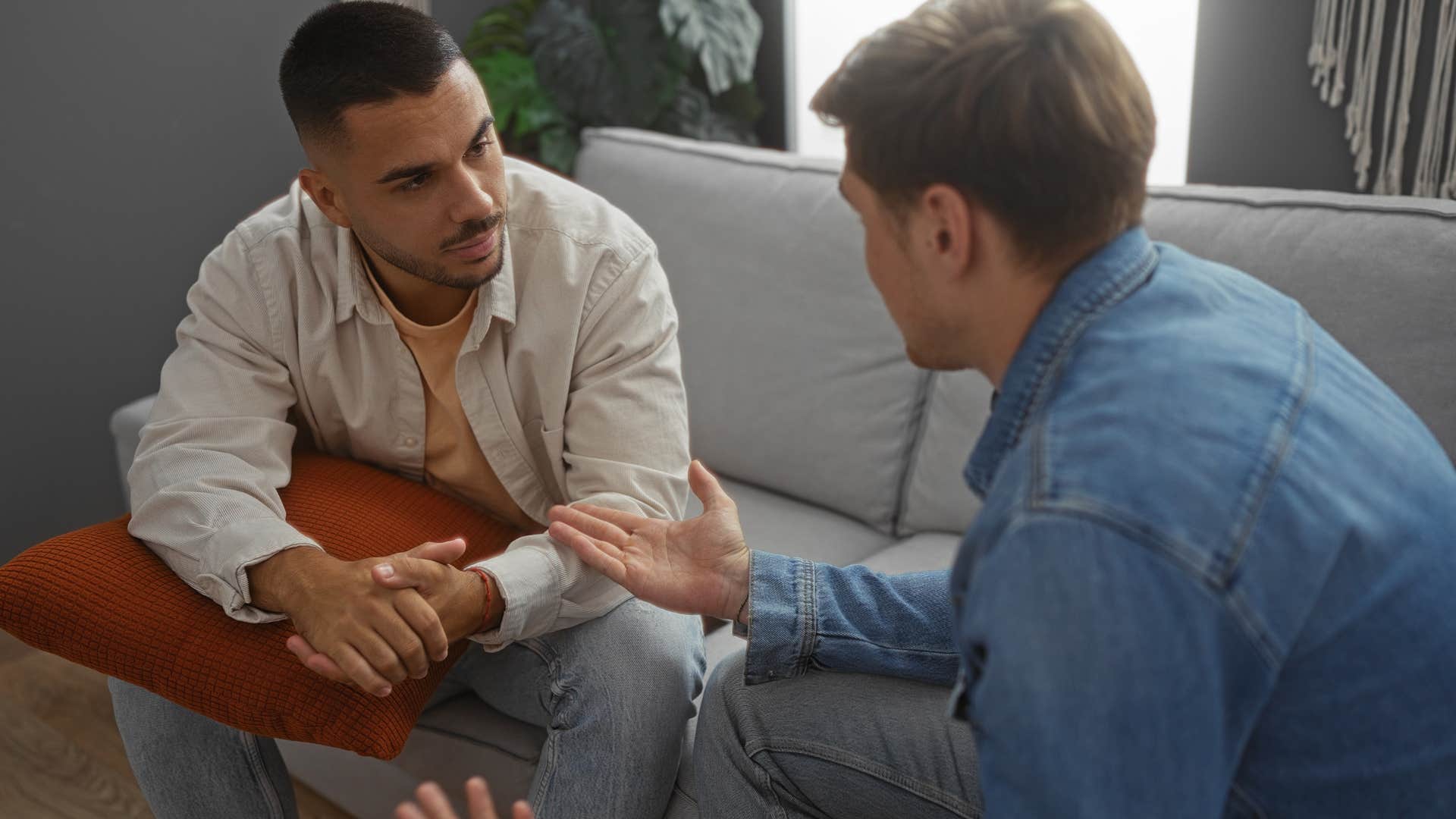People Who Are Deeply Empathetic Say These 11 Phrases Most People Never Think To Say
The tiny things deeply empathetic people say that the rest of us rarely think of.
 Alones | Shutterstock
Alones | Shutterstock We often see empathy as a driving force behind helping others or as a personality trait that leads to generosity and forgiveness instead of greed. But in reality, it’s a wide range of behaviors, small gestures, and language that show up differently in everyone. Even in casual conversations at home or quick chats with a coworker, deeply empathetic people tend to say phrases most others never even consider.
According to a study from the Journal of Personality and Social Psychology, empathy even bolsters a healthier relationships between us and strangers during fleeting, casual moments. Not only does a desire to understand other people’s perspectives and “put ourselves in their shoes” — as stereotypical definitions of empathy suggest — help foster this connection, but also a shift in mindset toward positivity that makes us more open to new connections, people, and experiences.
People who are deeply empathetic say these 11 phrases most people never think to say:
1. ‘Would it help if I just sat here with you?’
 Fizkes | Shutterstock.com
Fizkes | Shutterstock.com
Even when they’re not actively offering advice or speaking, empathetic people often have a kind of comforting, charismatic aura that other people lack. They’re a safe space for so many, not just because they know how to comfort others and listen, but also because they’re thoughtful with their presence and energy.
According to a NeuroImage study, deeply empathetic people often ask this question and emotionally support others to ease their emotional struggles, but simultaneously address and mend their own distress. So, no matter how selfless a question like this seems — offering up time and space to comfort another — it’s more mutually beneficial than people realize.
2. ‘I believe you’
 PeopleImages | Shutterstock.com
PeopleImages | Shutterstock.com
When so many people feel a sense of entitlement to an explanation from someone or a justification for the “why,” it’s refreshing to hear an empathetic person simply “believe you.” It’s not about proving their points or winning an argument – they just want people to feel heard and understood.
Even if it seems like the simplest bonding experience between people, a study from the Journal of Research and Personality found that people are more likely to report greater life satisfaction and better physical well-being when they feel understood by someone. Even when talking to a stranger or trying to resolve a problem at work, people who are deeply empathetic make an effort to trust in others and truly make them feel understood.
3. ‘What do you need most right now?’
 PeopleImages | Shutterstock.com
PeopleImages | Shutterstock.com
When dealing with a conflict in a heated debate or even talking to someone who’s struggling emotionally, sometimes all a person can think about is the next step. What they need to feel safe, what they need to do to be secure.
If you’re around people who are only thinking about themselves, chances are they’re not going to offer grace to you in these moments. If you don’t know what you need, don’t have support, or are feeling lost with no direction, they’re not going to wait for you — they’re going to blame and resent you.
However, deeply empathetic people often use questions like “What do you need from me?” or “What do you need most right now?” They give people grace when they’re hurting, treat them like human beings, and offer help whenever they can.
4. ‘I’ve been there before'
 SynthEx | Shutterstock.com
SynthEx | Shutterstock.com
Especially when followed up with a question like “Would you like to hear what worked for me?” empathetic people truly make people feel seen and heard by sharing these experiences. Whether it’s a niche work topic or a major relationship struggle, deeply empathetic people will often make an effort to extend a hand of solidarity to people through shared experiences.
Even if there’s some kind of barrier or frustration in the way of bonding, empathetic people use shared experiences to build bridges across them — forming strong connections and building trust with people by sharing pieces of themselves at the right time.
5. ‘You don’t need to explain yourself’
 Fizkes | Shutterstock.com
Fizkes | Shutterstock.com
Many people fall into the habit of over-apologizing or over-explaining their choices from a young age. They’ve become people-pleasers because they’ve always been tasked with “keeping the peace,” even at the expense of their own well-being.
However, empathetic people make sure others, even those who still have unresolved childhood trauma, don’t feel pressure to explain themselves or over-apologize. They can simply set their boundaries, express their emotions, and apologize without needing to prove themselves worthy of love, respect, or forgiveness.
6. ‘You don’t have to be strong here’
 Bearfotos | Shutterstock.com
Bearfotos | Shutterstock.com
Many people feel pressured into wearing a mask or suppressing their emotions around people, even their “closest” friends and loved ones. Whether it’s a matter of feeling safe and heard or simply dealing with internal insecurity, it’s a habit that empathetic people actively work to override in their close relationships.
They always say things like “I’m always here for you” or “you don’t have to be strong here” to cultivate safe spaces for everyone, whether they’re close friends or strangers on the street. They know what it must feel like to carry emotional burdens inside, by yourself, so they’re intentional about sharing the load in their closest connections.
7. ‘You’re not too much’
 Anatoliy Karlyuk | Shutterstock.com
Anatoliy Karlyuk | Shutterstock.com
With friends who’ve been encouraged to minimize themselves to be agreeable or shrink their personalities down to be more approachable to others, deeply empathetic people often say things like “you’re not too much” as a reminder. Even if everyone else doesn’t notice that they’re frustrated and inauthentic, empathetic people are careful about noticing how other people show up.
Especially in romantic relationships, it’s this authenticity that truly builds trust and promotes a foundation of stability in their connection, according to a study from the Journal of Experimental Social Psychology.
8. ‘I know it’s hard’
 Krakenimages.com | Shutterstock.com
Krakenimages.com | Shutterstock.com
Simply acknowledging another person’s struggle and any negative emotions they’re experiencing can often facilitate more powerful, bonding conversations and social interactions. Especially considering that acknowledging and supporting someone’s negative emotions is often far more uncomfortable than addressing their positive ones, like a 2021 study explains, it’s a feat that empathetic people do for others.
They want to create spaces where everyone feels safe to thrive, be accepted, and feel emotionally supported.
9. ‘Take your time’
 PeopleImages | Shutterstock.com
PeopleImages | Shutterstock.com
Whether it’s offering a bit of respite to a service worker living on edge or a friend who’s trying their best to appease you, people who are deeply empathetic often say things like “take your time” and “I’m not in a rush,” that other people never think to say.
They’re secure enough internally to sit with their emotions, make space for other people, and slow down, even in our culture that’s moving incredibly fast and sparking stress all the time.
10. ‘How do you feel?’
 Fit Ztudio | Shutterstock.com
Fit Ztudio | Shutterstock.com
Many people, especially in their close relationships and connections, resort immediately to giving unsolicited advice and feedback before truly showing up for their loved ones. Sometimes, when someone vents about their struggles and talks about their pain, they’re not looking for solutions to rid themselves of those emotions immediately, but to find a safe space to feel held.
“How do you feel?” is one of the questions people who are deeply empathetic say often. They care about ensuring people feel emotionally supported, rather than trying to “fix” everything as if it’s inherently bad to have big, complex emotions.
11. ‘You’re allowed to feel that way’
 Bogdan Cherniak | Shutterstock.com
Bogdan Cherniak | Shutterstock.com
Rather than trying to “fix” someone’s feelings, change their opinion, or invalidate their pain with an excuse, people who are deeply empathetic often say these things that most people never think to say. From “you’re allowed to feel that way” to “I’m here for you,” they’re careful about acknowledging and validating other people’s feelings, even if they don’t agree with or share them.
From arguments with a partner to struggles with a stranger in a coffee shop, empathetic people are present in their conversations and intentional about their language.
Zayda Slabbekoorn is a senior editorial strategist with a bachelor’s degree in social relations & policy and gender studies who focuses on psychology, relationships, self-help, and human interest stories.

